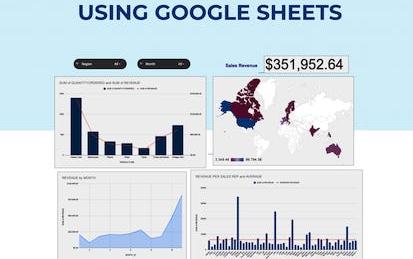

Our Courses

Create Customer Personas in Canva
By the end of this project you will have created a template for creating customer personas in Canva. After reviewing the Canva toolbar you'll create a customer persona template. Based on CRM data, social media information, and purchasing pattern information, customer personas will facilitate understanding of the ideal customer for your organization. They can then be leveraged to create effective marketing strategies and plans. Note: This course works best for learners who are based in the North America region. We’re currently working on providing the same experience in other regions.
-
Course by

-
 Self Paced
Self Paced
-
 2 hours
2 hours
-
 English
English

Setting Up Google Meet for Distance Learning
This is a self-paced lab that takes place in the Google Cloud console. Learn how to set up, manage, and use Google Meet as part of Google Workspace for Education.
-
Course by

-
 Self Paced
Self Paced
-
 1 hour
1 hour
-
 English
English

Protecting Data with NetApp Cloud Manager & Cloud Volumes ONTAP for Google Cloud
This is a self-paced lab that takes place in the Google Cloud console. In this lab, you will learn how to implement a full data protection strategy with NetApp Cloud Volumes ONTAP and Cloud Manager capabilities.
-
Course by

-
 Self Paced
Self Paced
-
 2 hours
2 hours
-
 English
English

Cybersecurity and Its Ten Domains
This course is designed to introduce students, working professionals and the community to the exciting field of cybersecurity. Throughout the MOOC, participants will engage in community discourse and online interaction. Participants will gain knowledge and understanding of cybersecurity and its domains.
-
Course by

-
 Self Paced
Self Paced
-
 24 hours
24 hours
-
 English
English

Create Charts and Dashboard using Google Sheets
In this 2-hour long project-based course, you will learn how to create effective charts and a dynamic dashboard to visualize data sets.
-
Course by

-
 Self Paced
Self Paced
-
 3 hours
3 hours
-
 English
English

Financial Management Capstone
The Financial Management capstone will provide a learning experience that integrates across all the courses within this specialization. You will analyze a situation taking the vantage point of a company and develop a financial management plan (for instance, a global company working in a specific geography chosen by students’ region or country of residence, or other consideration). You will design a deliverable to create value from the perspective of potential employers while achieving pedagogical and experiential goals.
-
Course by

-
 Self Paced
Self Paced
-
 8 hours
8 hours
-
 English
English

Particle Dynamics
This course teaches dynamics, one of the basic mechanics subjects of Mechanical Engineering. Students would be able to organize their knowledge about force and motion, work-energy, impulse-momentum in view of Newton's 2nd law and its integration over time and displacement. The Engineering Dynamics consists of two parts: particle dynamics and rigid body dynamics. This is the first part of the dynamics: Particle dynamics class will consist of lecture videos, which are about 15 min length (or a bit longer). These contain a couple of practice problem solving.
-
Course by

-
 Self Paced
Self Paced
-
 15 hours
15 hours
-
 English
English

Product Design: Draw a Classic Armchair using SketchUp
In this 1-hour long project-based course, you will learn how to conduct a complete research on the basic dimensions of a classic Armchair, design the Chair Legs using the research measurements, design the chair's handles and seat, design the back of the Chair, the Cochin and the Pillow and finally give it a realistic features by rendering the final design.
-
Course by

-
 Self Paced
Self Paced
-
 3 hours
3 hours
-
 English
English

Web3 and Blockchain Transformations in Global Supply Chains
The global supply chain is a $50 trillion industry and is the foundation of our global economy. While information technology has improved the flow of goods globally over the last few decades, as the COVID-19 crisis revealed there is still critical work to do. Today’s supply chains are complex, with parties conducting their transactions through a Byzantine network of computer systems with disparate applications like e-mail, phone, and fax. There are invoices, letters of credit, bank guarantees, bills of lading, tax forms, receipts, and other paperwork moving through this complex labyrinth.
-
Course by

-
 Self Paced
Self Paced
-
 13 hours
13 hours
-
 English
English

Computational Thinking with JavaScript 2: Model & Analyse
This is the second course in a sequence of four courses that develops essential 21st century computational thinking (CT) skills using the popular JavaScript programming language. At the end of this second course you will: know a framework for CT to help you model the real world using abstract data structures; have developing CT skills so that you can perform comon data analytics tasks; be able to read and write programs in JavaScript that involve processing, analysing and visualizing data, using a specialised library; and post your creations on the web to share your code with others. This co
-
Course by

-
 Self Paced
Self Paced
-
 20 hours
20 hours
-
 English
English

Capstone: Data Science Problem in Linear Algebra Framework
In this course, you'll review the specifics of the Capstone project. In addition, you will create and run your regression model and share your results with your peers. Let's get started!
-
Course by

-
 Self Paced
Self Paced
-
 9 hours
9 hours
-
 English
English

Cloud Computing Fundamentals on Alibaba Cloud
Course Description Looking to dive into the world of Alibaba Cloud with a comprehensive introduction to the range of products and solutions offered by Alibaba Cloud? Fundamental Architecting on Alibaba Cloud is a course designed for users looking to start this journey with a look into Alibaba Cloud's core products. Fundamental Architecting looks into storage, networking, auto-scaling, and security solutions as well as scenarios to best combine these products to create a complete cloud-based architecture.
-
Course by

-
 Self Paced
Self Paced
-
 12 hours
12 hours
-
 English
English

Cypress end to end testing and intercepting network call
Cypress is a complete end-to-end test automation tool built to test modern-day web applications. Cypress is used by developers or QA engineers building web applications using modern JavaScript frameworks. In this hands-on guided project, you will learn — 1. Architecture of Cypress and a new way of UI automation testing 2. Controlling the network traffic 3. Intercepting HTTP request calls 4. Intercepting and updating HTTP request/response
-
Course by

-
 Self Paced
Self Paced
-
 4 hours
4 hours
-
 English
English

Data Management with Azure: Implement Compliance Controls
Confidential data stored within a Microsoft SQL Server or Azure SQL Database should be classified and kept safe within the database. This classification allows the SQL Server users, as well as other applications, to know the sensitivity of the data that is being stored. Classification and protection of the data stored in the database is a must – implementation of row-level security can restrict row-level access based on a user's identity, role, or execution context and with the implementation of Dynamic Data Masking you can limit sensitive data exposure to non-privileged users.
-
Course by

-
 Self Paced
Self Paced
-
 2 hours
2 hours
-
 English
English

Effective Communication Capstone Project
In the Effective Communication Capstone learners apply the lessons of Business Writing, Graphic Design, and Successful Presentation to create a portfolio of work that represents their mastery of writing, design, and speaking and that expresses their personal brand. The portfolio includes three individual elements—a written memo, a slide deck, and a presentation—integrated around a single topic. We provide the elements for a basic capstone, but we also invite our learners to create their own project if they so choose.
-
Course by

-
 Self Paced
Self Paced
-
 14 hours
14 hours
-
 English
English

Applications in Engineering Mechanics
This course applies principles learned in my course “Introduction to Engineering Mechanics” to analyze real world engineering structures. You will need to have mastered the engineering fundamentals from that class in order to be successful in this course offering. This course addresses the modeling and analysis of static equilibrium problems with an emphasis on real world engineering systems and problem solving.
-
Course by

-
 Self Paced
Self Paced
-
 16 hours
16 hours
-
 English
English

Applied Public History: Places, People, Stories
This course introduces learners to applied public history: understanding and interpreting the past today, and engaging diverse communities in the practice of making and sharing histories. The course draws on project case studies, expert insights and diverse perspectives to model exciting approaches to researching and sharing the history of places and people.
-
Course by

-
 Self Paced
Self Paced
-
 26 hours
26 hours
-
 English
English

Design infographics with Prezi
This project will allow you to discover Prezi, an online platform for designing presentations and marketing content of all kinds. You'll learn about Prezi features and you will be able to create engaging and professional infographics with Prezi, in order to visualize data and present it in an easy-to-understand overview. This project is for people who would like to learn how to use Prezi to create clear, engaging, high-quality, and dynamic infographics.
-
Course by

-
 Self Paced
Self Paced
-
 3 hours
3 hours
-
 English
English

Nutrition Hot Topics and Controversies
Within the ever-changing nutrition landscape, it becomes difficult to understand current trending topics. Without a doubt, your friends and neighbors will have questions regarding these nutrition hot topics. Most people want to know what to believe or discard from what they hear, but they often lack the tools or the knowledge (or the time) to research topics as they become popular. This course has been designed to take an in-depth approach to explain the science behind many nutrition hot topics and controversies faced by discerning readers today including organic vs.
-
Course by

-
 Self Paced
Self Paced
-
 3 hours
3 hours
-
 English
English

Career planning: Your career, your life
Are you satisfied with your career? Where do you see yourself in the future? No matter where you are on your professional journey, careful planning will help you reach your goals. This course will help you adapt to rapidly evolving job markets by enhancing your self-knowledge and confidence to explore wider career opportunities. You will create a career development plan, encompassing your career goals, skills and knowledge development for your current and future jobs, and learn how to make the most of your strengths, talents, and experience.
-
Course by

-
 Self Paced
Self Paced
-
 18 hours
18 hours
-
 English
English

Creative Thinking
Leverage your imagination and curiosity to think creatively! Find outside-the-box solutions to even your toughest challenges.
-
Course by

-
 Self Paced
Self Paced
-
 4 hours
4 hours
-
 English
English

Foundations of Healthcare Systems Engineering
Through dynamic video lectures and practical application questions, you will learn about the Foundations of Healthcare Systems Engineering. In this course you will learn about the current lack of synchronized, efficient, and integrated healthcare systems, which are some of the drivers for improvements to healthcare delivery. Also in this course, you will learn about the different types of systems and how they are translated to the healthcare field for appropriate systems engineering process applications, with exemplars.
-
Course by

-
 Self Paced
Self Paced
-
 6 hours
6 hours
-
 English
English

Introduction to Thermodynamics: Transferring Energy from Here to There
COURSE DESCRIPTION This course provides an introduction to the most powerful engineering principles you will ever learn - Thermodynamics: the science of transferring energy from one place or form to another place or form. We will introduce the tools you need to analyze energy systems from solar panels, to engines, to insulated coffee mugs.
-
Course by

-
 Self Paced
Self Paced
-
 16 hours
16 hours
-
 English
English

Financing Infrastructure in African Cities
The world is urbanizing fast. In less than a century more than 1 billion people have been urbanized. That translates into the fact that more than half of the world’s population is already living in cities. Experts forecast that very soon Africa will become one of the most urbanized continents. However, almost 70% of world’s urban population is living in the cities where governments are struggling to provide basic services like sanitation, schools, hospitals, and adequate clean water. The reason is that, their governments do not have enough money.
-
Course by

-
 Self Paced
Self Paced
-
 22 hours
22 hours
-
 English
English

Our Place in the Cosmos
Come aboard! If you decide to take this course, you will expand your horizon of what is possible for you in the cosmos. In Course 1 (Our Place in the Cosmos) of this four course specialization, there are 39 learning objectives spread out over 4 weeks and 10 lessons. Week 1 - You will learn about the course and the specialization as a whole as well as the method used to guide you through the material. You will also get to meet the crew of the USS Pathway to Space.
-
Course by

-
 Self Paced
Self Paced
-
 20 hours
20 hours
-
 English
English



